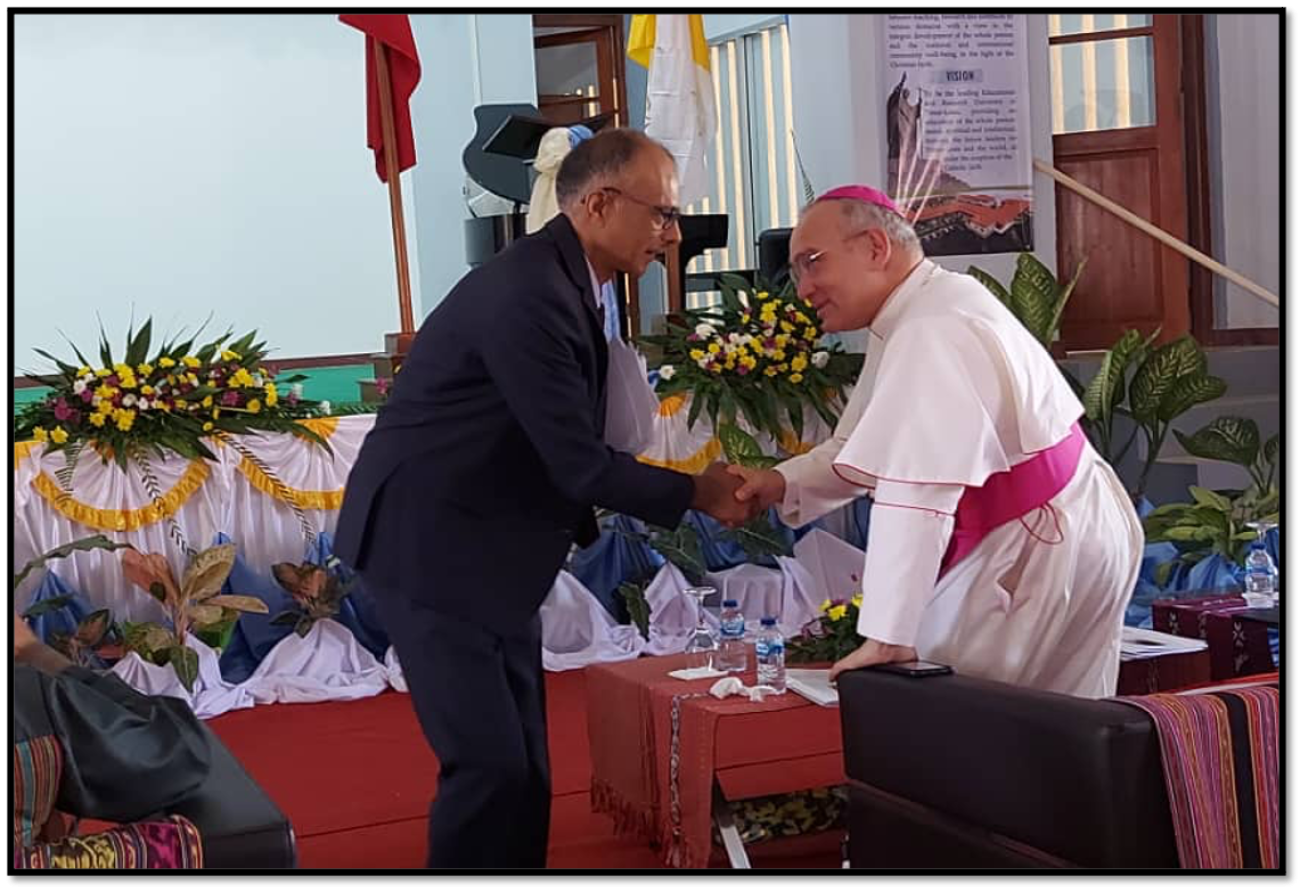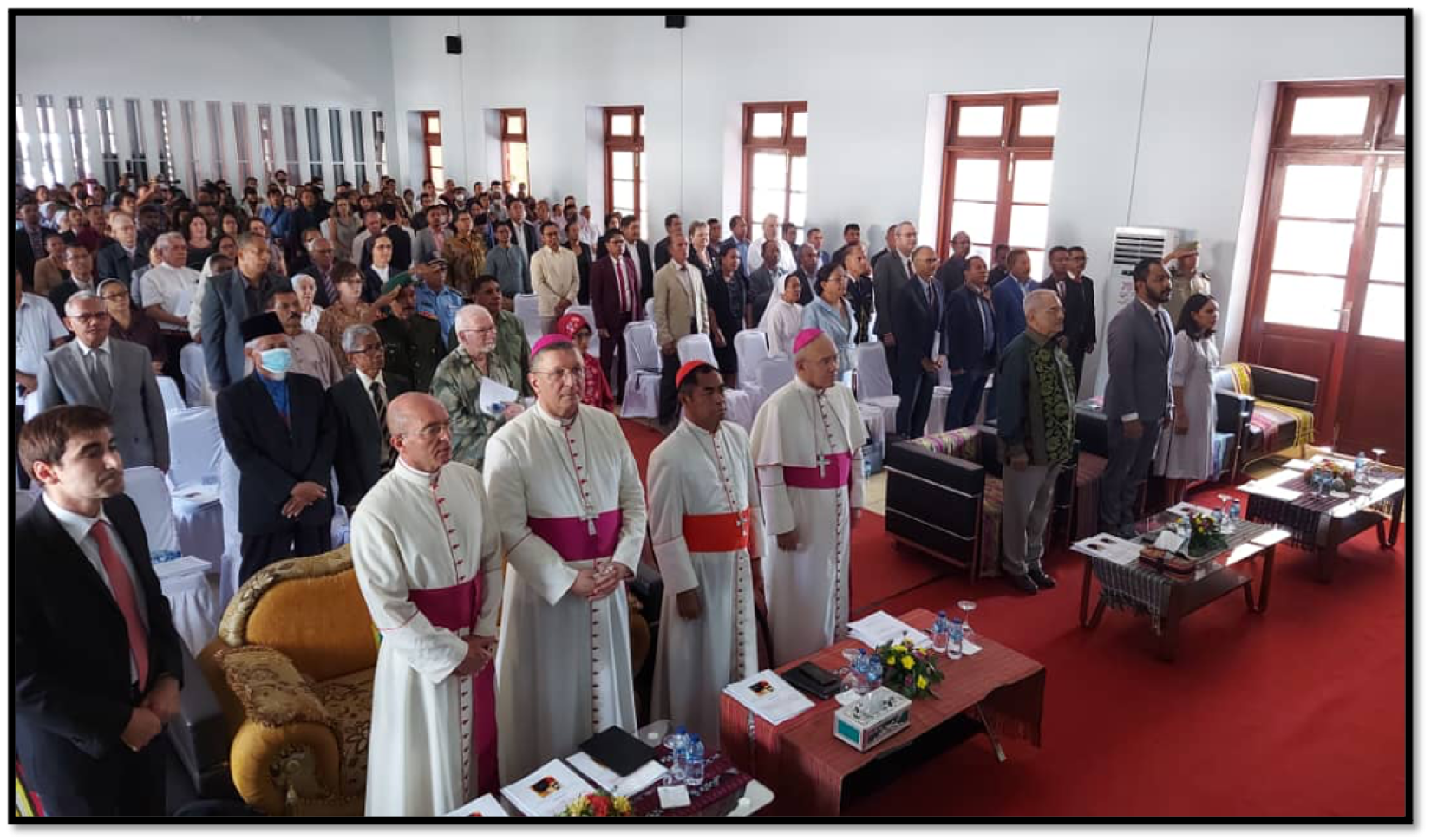Putting Human Fraternity into Practice

By Roy Trivedy, United Nations Resident Coordinator in Timor-Leste
One of the most significant and enduring legacies that any one of us can leave is to a life of peace and to demonstrably promote human fraternity and kindness through our individual actions.
This week Timor-Leste became the first nation in the world to include the “Document on Human Fraternity for World Peace and Living Together” as part of its core national values. This Document was prepared in February 2019 by two of the great religious leaders of our time, Pope Francis and the Grand Imam of Al-Azhar Ahmed Al-Tayeb, representing different faiths manifesting their belief in the importance of “fraternity’’ to promote world peace.
In Timor-Leste, HE President, Dr Jose Ramos Horta, informed all of us about the significance of this Declaration earlier this year. Later, the National Parliament unanimously approved the Document on 12 May and declared its commitment to the values of global peace, dialogue and respect for human rights. The Parliament also urged the Government and all citizens to promote the importance of human fraternity, starting at domestic level and extending through practical actions, to all levels of society with the aim of improving the welfare of all citizens, and at the multilateral level by adopting "protective conduct that promotes peaceful coexistence among peoples." On the occasion of his swearing-in ceremony as President of the Republic, HE President Dr José Ramos-Horta, recommitted to making every effort to adapt and include the Document in school curricula in Timor-Leste. So, it was with great sense of pride that this week with the visit of HE Archbishop Edgar Pena Parra, Deputy Prime Minister of the Vatican, the President, Parliament and Government of Timor-Leste launched “the Centro da Fraternidade Humana Timor-Leste”. This is an auspicious moment in the country’s history, coinciding with the 20th Anniversary of Timor-Leste’s Restoration of Independence.
Viva Fraternidade Humana! Viva Timor-Leste!

I was honoured to be invited to share my perspectives on the concept of “Human Fraternity” and the Document at a special symposium organised by the Universidade Catolica Timorense (UCT), Sao Joao Paulo II. It was a very special event.
In my remarks I drew inspiration from Article 1 of the Universal Declaration of Human Rights. The UDHR is a milestone document in the history of Human Rights. Drafted by representatives with different legal and cultural backgrounds from all regions of the world, the Declaration was proclaimed by the United Nations General Assembly in Paris in December 1948 as a common standard of achievements for all peoples (regardless of age, race, ethnicity, gender, abilities or other characteristics) and for all nations. The UDHR for sets out, for the first time, the fundamental human rights that must be universally protected. It provides the fundamental basis for all ‘human development’ work and has been translated into 500 languages.
The UDHR states: "All human beings are born free and equal in dignity and rights. They are endowed with reason and conscience and should act towards one another in a spirit of brotherhood."
The Sustainable Development Goals (SDGs), agreed by world leaders in 2015, also built on the basic premise that the future of humanity is interdependent and inter-connected. Peace, security and sustainable development can only be achieved through collective efforts.
Saint Francis of Assisi, in his book "The Art and Architecture of Peace", reiterates that the "path to peace does not mean making society blandly uniform but getting people to work together, side by side, in pursuing goals that benefit everyone".
Religious leaders and prophets from all faiths have emphasised a similar message of peace, love, and fraternity for hundreds of years.
One of the most significant and enduring legacies that any one of us can leave is to a life of peace and to demonstrably promote human fraternity and kindness through our individual actions.
Why is this important?
Because history reminds us that without peace, there can be no sustainable development; conversely, without sustainable development, there can be no enduring peace!
The reality however in our world today is that we continue to live in a world characterised by conflicts, pandemics, climate changes, and violence (sadly also including inter-faith conflicts) that continue to cause enormous suffering, scar the lives of many of the poorest and most vulnerable people and restrict local, national and global development.
In the words of one eminent historian: “We are all humans until race, ethnicity, gender disconnected us, religion separated us, politics divided us, and wealth, class and caste classified us! The UN Secretary General recently said: "Our world is blighted by war, battered by climate chaos, scarred by hate, and shamed by poverty & hunger. We need to come together around solutions - and we need to give hope."
So how can we put the principles of fraternity into practice?
Let me suggest some ways in which we can all contribute.
First, we need to be at genuine peace as individuals ourselves. “It is only through inner peace that we can have true outer freedom,” as said by Shri Chinmoy in his book The Adventure of Life. Without this, human beings will continue to constantly compete and rival each other. The practice of prayers, meditation, yoga and other cultural and religious rituals all seek to promote peace in ourselves. Even a few minutes of quiet contemplation and reflection each day can benefit each and every one of us as well as to the lives of our nearest and dearest ones.
Secondly, the importance of inter-faith dialogue and action to recognise the valuable contribution that people of all religions and beliefs can make to humanity and the contribution that dialogue between faith groups can contribute to increased awareness and understanding of the shared values of humankind. Inter-faith action has the power to influence peoples lives and can play a vital role in promoting positive collective action to prevent and reduce: gender based violence (GBV); violence against children and people with disabilities; homelessness; malnutrition & hunger; and other societal challenges.
Thirdly, the importance of inclusion by raising awareness about different cultures and religions or beliefs and promoting tolerance, which involves societal acceptance and respect for religious and cultural diversity, including regarding religious expression. Education, in particular at schools and colleges, must contribute meaningfully to promoting tolerance and eliminating discrimination based on religion, beliefs, abilities, gender, class, caste or other ‘differences’. As human beings, we have more in common than any of these 'differences that keep us apart. We must encourage activities that foster tolerance, pluralistic traditions, mutual respect and the diversity of beliefs to actively promote genuine human fraternity at the regional, national and local levels.
Fourthly, just as we commit to human fraternity, we also need to commit to protecting and supporting other life forms on our planet! Our lives depend not just on other human beings but on the beautiful flora and fauna that inhabit the Earth. If human beings continue to destroy the natural world, our own existence will continue to be threatened. We must promote better custodianship of our planet!
Finally, let me propose that we can all put some of these principles into action by doing at least one act of kindness every day for someone who is a stranger (a person who is not your friend or family).
By following these basic principles, I believe we can build a better world for all and do more to promote cultural and religious tolerance, understanding and dialogue in Timor-Leste and the world.
I congratulate the leaders of Timor-Leste for their commitment to ‘human fraternity’, now we all have an opportunity to live by the principles expounded in the visionary and historic Document on Fraternity.
-END-














